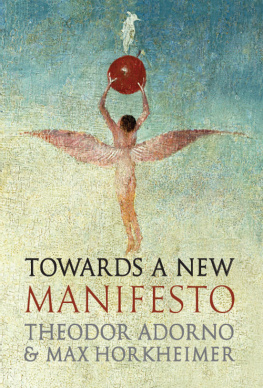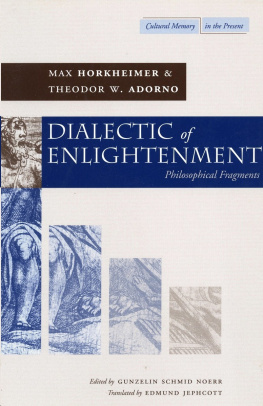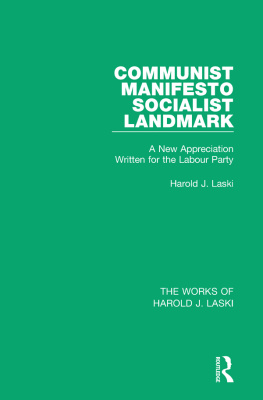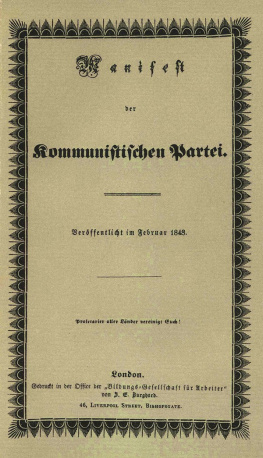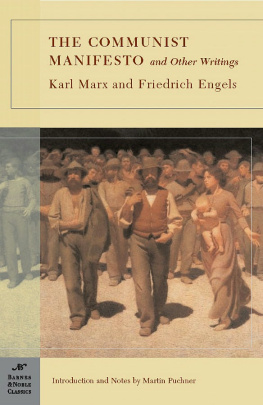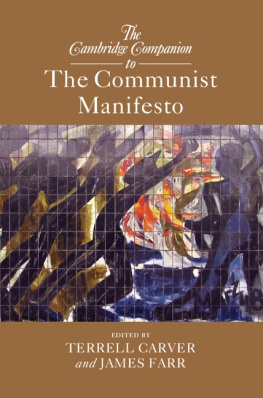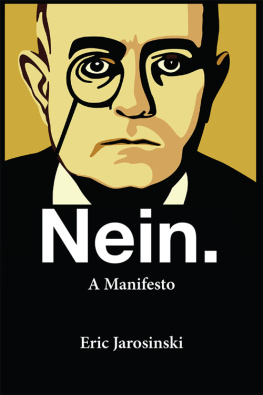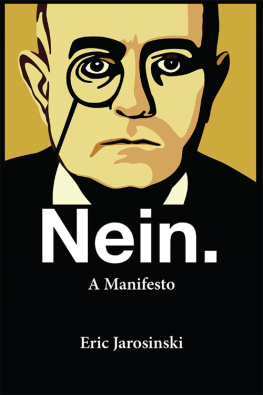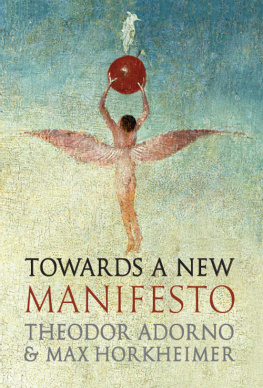TOWARDS A NEW MANIFESTO
TOWARDS A NEW MANIFESTO
THEODOR ADORNO
& MAX HORKHEIMER
Translated by
Rodney Livingstone
First published by Verso 2011
Translation Rodney Livingstone 2011
Originally published under the title Diskussion ber Theorie
und Praxis, an appendix to vol. 13 of Max Horkheimer,
Gesammelte Schrift en, Nachgelassene Schrift en 19491972
S. Fischer 1989
All rights reserved
The moral rights of the authors have been asserted
1 3 5 7 9 10 8 6 4 2
Verso
UK: 6 Meard Street, London W1F 0EG
US: 20 Jay Street, Suite 1010, Brooklyn, NY 11201
www.versobooks.com
Verso is the imprint of New Left Books
e-Book ISBN-13: 978-1-84467-894-5
British Library Cataloguing in Publication Data
A catalogue record for this book is available from the British Library
Library of Congress Cataloging-in-Publication Data
A catalog record for this book is available from the Library of Congress
Typeset in Minion by Hewer UK Ltd, Edinburgh Printed in the US by Maple Vail
CONTENTS
Introduction to Adorno & Horkheimer
A life-long intellectual partnership between two major thinkers, so close that their most celebrated single texts were co-authored and their names are difficult to dissociate, is rare enough to rank as virtually a sport of history. There seem to be only two cases: in the nineteenth century, Marx and Engels, and in the twentieth century, Horkheimer and Adorno. Might they be regarded as prefigurations of what in a post-bourgeois world would become less uncommon? Their patterns differed. Marx and Engels, born two years apart, were contemporaries; once their friendship was formed, collaboration between them never ceased. Adorno was eight years Horkheimers junior, and a close working relationship came much later, with many more vicissitudes: initial meeting in 1921, intermittent friction and exchange up to the mid-1930s, concord only in American exile from 1938 onwards, more pointedly distinct identities throughout. The general trajectory of the Frankfurt Institute for Social Research is well known, as over time critical theoryoriginally Horkheimers code-word for Marxismconfined itself to the realms of philosophy, sociology and aesthetics; to all appearances completely detached from politics. Privately it was otherwise, as the exchange below makes clear.
This unique document is the record, taken down by Gretel Adorno, of discussions over three weeks in the spring of 1956, with a view to the production ofas Adorno puts ita contemporary version of The Communist Manifesto. In form it might be described, were jazz not anathema to Adorno, as a philosophical jam-session, in which the two thinkers improvise freely, often wildly, on central themes of their worktheory and practice, labour and leisure, domination and freedomin a political register found nowhere else in their writing. Amid a careening flux of arguments, aphorisms and asides, in which the trenchant alternates with the reckless, the playful with the ingenuous, positions are swapped and contradictions unheeded, without any compulsion for consistency. In substance, each thinker reveals a different profile. Horkheimer, historically more politicized, was by now the more conservative, imbibing Time on China, if not yet to the point where he would commend the Kaiser for warning of the Yellow Peril. Though still blaming the West for what went wrong with the Russian Revolution, and rejecting any kind of reformism, his general outlook was now close to Kojves a decade later: We can expect nothing more from mankind than a more or less worn-out version of the American system. Adorno, more aesthetically minded, emerges paradoxically as the more radical: reminding Horkheimer of the need to oppose Adenauer, and envisaging their project as a strictly Leninist manifesto, even in a period when the horror is that for the first time we live in a world in which we can no longer imagine a better one.
Publishers note
1
The Role of Theory
MARCH 1956
1. Never was sociology as bankrupt as it is today with the idea of the doubling of the world.
2. Sub specie aeternitatis: all will be well (even if the party no longer exists).
3. Work has been called on to replace the belief that all will be well.
A D 1 [Never was sociology as bankrupt as it is today with the idea of the doubling of the world.]
H ORKHEIMER : What we see today is a doubling of the world.
A DORNO : That is exactly Marxs epistemology. He said that the task of theory is to reflect reality.
H ORKHEIMER : Indeed, reflect the way it looks from the situation of the proletariat. Developments in this so-called Western hemisphere have led to the growing tendency to translate thought into scientific statement. You end up with nothing more than a few clichs, such as freedom or religion. A further factor is that we no longer have either the bourgeoisie or the proletariat, which might have taken its place. From a certain point on the bourgeoisie has to double itself. In contrast, the workers still had a utopia. Then Marx came along and took away their utopia with the aid of the doubling process. On the one hand, he brought them closer to reality; but he then did away with the tension with reality.
A DORNO : The motif of subjectivism. [Its] link with positivism.
H ORKHEIMER : The form taken by immiseration has undergone great changes.
A DORNO : It must be said that even so subjective consciousness cannot simply be reduced to insignificance. Thats what is done by the type of Marxism that becomes rigidly dogmatic and really does turn into the ideology of existing conditions. If a worker no longer notices that he is a worker, this has important implications for theory.
H ORKHEIMER : The entire rationale for theory seems to have disappeared because on the one hand the bourgeoisie transforms thought into facts and on the other the party no longer exists.
A DORNO : The Russians too no longer have any theory but only mumbo-jumbo and positivism.
A D 2 [Sub specie aeternitatis: all will be well (even if the party no longer exists).]
A DORNO : Reason, which is essential to keep the machinery in motion, necessarily contains its other. When you start to think, you cannot stop short at purely reproductive thinking. This does not mean that things will really work out like that, but you cannot think without thinking that otherness. The general stultification today is the direct result of cutting out utopia. When you reject utopia, thought itself withers away. Thought is killed off in the mere doubling process.
H ORKHEIMER : Language is urbanity. The role of towns.
A DORNO : The idea of truth transcends positivity.
H ORKHEIMER : And for something to be true means that it is so constituted that everyone must acknowledge it.
A DORNO : The entire mess today arises from a subjectivity that is ignorant of itself, that mistakes itself for objectivity. The idea of the good that is tacitly assumed in the theory stems from the fact that thought necessarily includes the element of reflection. This cushions the effect of our actions. Just as the imagination developed out of the age-old misdeeds of biology among other things, helping to strip them of their demonic aspect, in the same way theory contains an anti-mythological dimension. This means that because we pause to reflect we do not just lash out blindly. A person who thinks does not just react with his fists, does not just devour things unthinkingly. The time lag caused by the moment of reflection between hunger, fury and lashing out is the origin of the idea that all will be well. By confronting the ends with the means something necessarily comes into being that brings about the suspension of the entire blindness and immediacy. For me to master nature, I have to think. But by thinking, I interpose a medium between the object of action and myself that strives to go beyond both. The gesture of the savage who pauses for an instant to reflect whether or not he wishes to eat his prisoner contains teleologically the end of violence.

